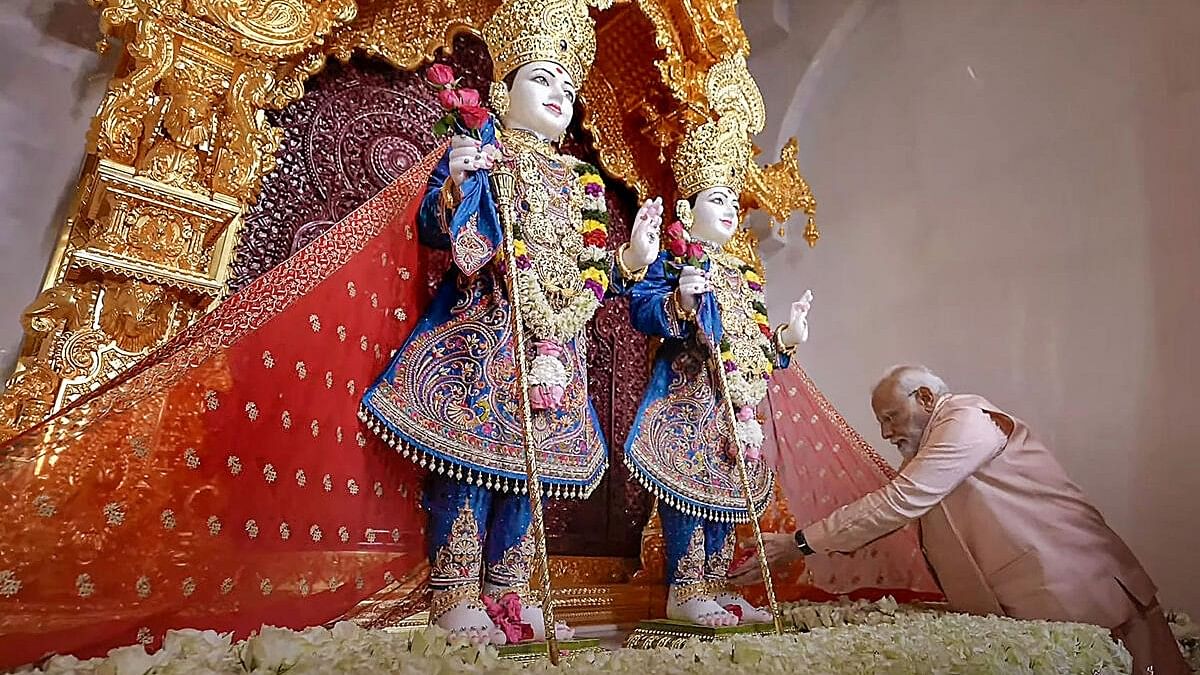
Prime Minister Narendra Modi during the inauguration of the BAPS Hindu Mandir, in Abu Dhabi, UAE.
Credit: PTI Photo
New Delhi: With Prime Minister Narendra Modi inaugurating the first Hindu temple in Abu Dhabi on Wednesday, India joined the United Arab Emirates (UAE) to call the shrine a celebration of the friendship between the two nations.
“This temple will be a symbol of unity and harmony,” Modi said after inaugurating the temple built by Bochasanwasi Shri Akshar Purushottam Swaminarayan Sanstha (BAPS) headquartered in Gujarat.
The shrine is the first Hindu temple in the capital of the UAE. Dubai, the most populous city in the UAE, however, already had two more places of worship for the Hindus.
The UAE, comprising seven emirates, is the home to 3.5 million Hindus. “I am confident that a large number of devotees will come here in the coming times,” the prime minister said, adding that the shrine would help expand people-to-people ties between India and the UAE. He thanked the UAE President Mohamed bin Zayed Al Nahyan and his government for supporting the construction of the temple, particularly for granting the land for it.
A joint statement issued by India and the UAE on Wednesday noted that the BAPS Hindu Mandir in Abu Dhabi was the embodiment of the West Asian nation’s “global commitment to harmony, tolerance, and peaceful coexistence”.
Modi wore a light pink silk dhoti and kurta paired with a jacket and stole as he visited the temple before formally inaugurating it. He also participated in “Global Aarti”, which was performed simultaneously at over 1,200 BAPS temples worldwide. He offered water in the virtual Ganga and Yamuna rivers at the temple before inaugurating it.
The shrine was built on a 27-acre site in Abu Mreikhah near Al Rahba off the Dubai-Abu Dhabi Sheikh Zayed Highway, at a cost of around Rs 700 crore.
The temple in Abu Dhabi was the second Hindu shrine to be inaugurated by the prime minister after he led the consecration of the Ram Mandir at Ayodhya in Uttar Pradesh on January 22.
Modi was on a tour to the UAE on Tuesday and Wednesday. He had a meeting with the UAE president in Abu Dhabi on Tuesday.
The two leaders witnessed the signing of several pacts, including a new Bilateral Investment Treaty (BIT) for promoting and protecting flows of capital between the two nations as well as an MoU for the creation of an intergovernmental framework between India and UAE on the India-Middle East-Europe Economic Corridor (IMEEC) for including development and management of a logistics platform, including a digital ecosystem, and provision of supply chain services to handle all types of general cargo, bulk, containers and liquid bulk to enable the ambitious connectivity initiative, launched on the sidelines of G20 Leaders’ Summit in New Delhi.
The prime minister visited Dubai earlier on Wednesday. He met Mohammed bin Rashid Al Maktoum, the ruler of Dubai and the prime minister of the UAE.
“People have trust in the intent and commitment of the government of India. This was possible only because we prioritized public sentiments,” he said, addressing the World Governments Summit in Dubai. He also said that the world now needed inclusive and corruption-free governments. He asserted that his mantra over the years has been 'minimum government, maximum governance'.
"Terrorism in various forms is bringing new challenges before humanity every day. Today, climate challenges are becoming widespread with time. On the one hand, there are domestic concerns, on the other hand, the international system seems in disarray," Modi said.
